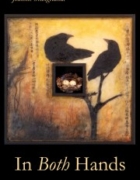Susan Landgraf, Crossings
TRIPLE NO. 17: “Crossings,” Susan Landgraf. Ravenna Press, 2022, pp. 49-82, $12.95, paper, www.ravennapress.com.
Ah, the Triples! This is an amazing series from our local Ravenna Press, and well worth your time. Triple No. 17 offers not only a chapbook by Susan Landgraf, but also Philip Quinn’s “Home Movies (from The Afterlife),” and Suzanne 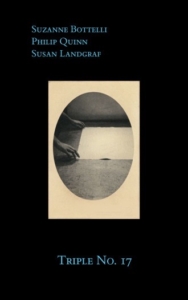 Bottelli’s “American Grubble.”
Bottelli’s “American Grubble.”
“Crossings” (with a subtitle: “Past to Present to Future and Between”) includes 22 poems, divided into 3 short sections. There are multiple threads, but a dominant one is wings. From the first poem, “Crowkeeper,” to the last, wings and winged creatures are both literal and symbolic. Birds cut the air with slick wings, painters molt like birds, a newborn gets his wings “stuck // like the moth / in a jar” (“Crossing Over”), an old woman’s head bobs like a pigeon’s, feathers poke out of pockets and men yearn to turn into birds: “he raised his arms again and again / and the sky turned a rainbow / of green, black-tipped, blue and white” (“Birdman”). Even Pegasus makes an appearance.
In “Fear of Birds,” which is ostensibly about carpentry, a bird’s mouth fits along the rafters, “joints flush, compounds smoothed / and feathered,” and in the closing lines the carpenter’s daughter becomes “the sound of birds /their cacophonous scattering.”
Besides wings, we get beetles and silvered fishes, footprints in concrete, sand-scrubbed sheets. Landgraf invites us to notice all of it, color, texture, sound.
But, about those wings. This poem, all one sexy sentence, evokes flight:
Midnight
Loving him was like dancing on a drum,
grapes ripe near to bursting, fields turned
burgundy, scarlet, golden loving him
like dancing on a drum, she said, his fingers
circling her skin, tracing her curves until
her heart was a bird flying out of her body
like dancing on a drum, she said, in a metal-
roofed room with a tuba and bass, Satchmo
on his sax and Vaughn in her summertime
and loving him was dancing out of their skins
and back, a week’s worth of Saturday nights
in a slow opening of loving him in a cave
of firecrackers, stars falling out of the sky,
a full moon, its white, white eye pressed
to the frosted window and loving him
was dancing on a drum, she said, so when
he left, she didn’t know how to walk.—Susan Landgraf
Only one line, “her heart was a bird flying out of her body,” comes right out and shouts “flying,” but it seems (to me) a precis of the whole poem and the poem’s subject.
I attended Landgraf’s recent reading at Soul Food Café in Redmond, and was able to spend some time talking with her about her poems, and her 2019 writing exercise book, The Inspired Poet (Two Sylvias Press). You can learn more about her at the Triples page (such a wonderful series) at http://ravennapress.com/books/series/triple-series/, and at The Academy of American Poets, https://poets.org/poet/susan-landgraf.
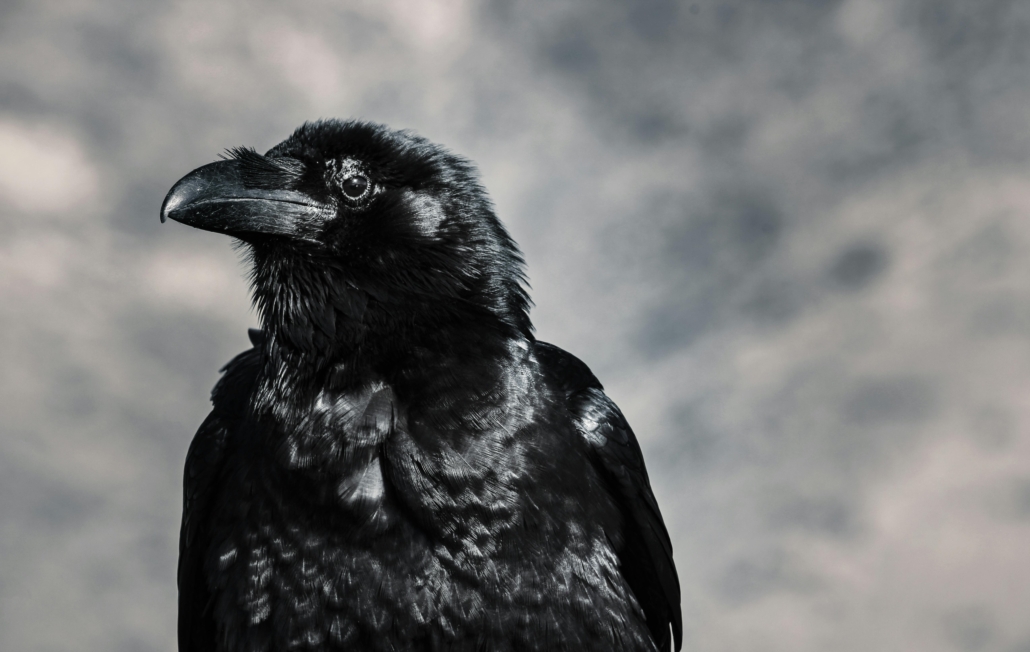

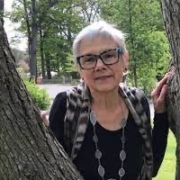

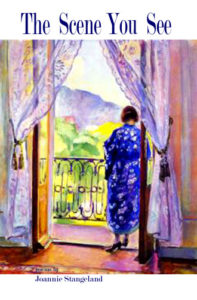 THE SCENE YOU SEE, Joannie Stangeland. Ravenna Press, PO Box 1166, Edmonds, WA 98020, 2018, 60 pages, $14.95 paper,
THE SCENE YOU SEE, Joannie Stangeland. Ravenna Press, PO Box 1166, Edmonds, WA 98020, 2018, 60 pages, $14.95 paper, 